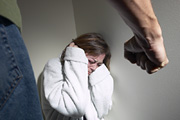DOMESTIC VIOLENCE IS CHILD ABUSE
You can not believe the effects that your domestically
violent relationship is having on your children…Do you realize that:
· Children who witness domestic violence are 6 times more likely to attempt suicide.
Children experience a great deal of fear and have
multiple ways of expressing that fear. Abuse on a child has a negative
affect on them both emotionally & physically.
Common behaviors in response to abuse may be:
· Eating, sleeping disorders
· Depression, emotional neediness
· Children learn that violence is an acceptable
· Solve problems by the age of 5 yr old
· Over compliance, clinginess, withdrawal
· Aggressive acting out / destructive rages
· Detachment, avoidance, a fantasy or make
· Believe family life
· Difficult to diagnose physical illnesses
· Finger biting, restlessness, shaking,
· Head banging, stuttering
· School problems
· Thoughts of suicide
· Harms animals
Did you know that 70 % of children in violent
homes are abused!
Sexual abuse commonly starts by the age of 3 years
old.
Children keep the abuse a
secret from their brothers, sisters, and non-abusive parent. They keep the secret deep down inside because of fear and to
protect the family. What they don't realize, is that it keeps
The family from getting helps. Most of the time, other brothers and sisters are being abused anyway and are keeping the same secret.
Mothers frequently say...if
I only knew! If you are a Victim of or Survivor of Domestic Violence please realize
that you are not and were probably not the only person in the family being abused by your abuser…Abusers like to control
everyone.
Children who witness domestic
violence are 50% more likely to abuse drugs, alcohol, and are more likely to engage in criminal acts.
Children that are abused frequently display one
or more of these behaviors.
Symptoms of Abuse
It is normal for a child of domestic violence
to show symptoms of that abuse. Below are some common feelings and behaviors
of children that are either abused or witness abuse.
- Feel
guilty for the abuse and for not stopping it
- Grieve
for family and losses in their life
- Confused
about their feelings toward their parents
- Fear
of: being abandoned, expressing emotions, the unknown
- Angry
about the violence and chaos in their lives
- Depressed,
feelings of helplessness, powerlessness
- Embarrassed
by the behavior of abuse and its effects at home
- Blames
others for their own behavior
- Believes
it is acceptable to hit, express anger and control through power people they care for in order to meet their own needs
- Difficulty
trusting others
- Has
low self-esteem, thinks poorly of themselves
- Acts
out or withdraws
- Overachieves
or underachieves
- Refuses
to go to school
- More
concerned for others than themselves; takes on a parent roll in the home
- Aggressive
or passive
- Excessive
attention seeking
- Bedwetting;
nightmares
- Out
of control behavior
- Isolates
themselves from friends and relatives
- Relationships
are frequently stormy...starts intense and end abruptly
- Difficulty
in trusting adults
- Handles
their anger poorly and has difficulty solving problems
- Plays
rough with peers
- Frequent
headaches, stomach aches
- Nervous,
anxious, short attention span
- Tired,
lack of energy
- Desensitized
to pain
Children do not have to be physically abused to
be affected by abuse in the home. Witnessing abuse on others or hearing it from
another room in the house leaves a lasting impression on the child.
In general, 70% of men who abuse their female
partners also abuse their children. In 100% of these relationships the Children are being emotionally abused.
Nearly 70% of the children who go to shelters for battered women are victims of abuse or neglect.
3.3 million children in the United States, between ages 3 and 17 years, are yearly
at risk of exposure to marital violence.
Studies of abused children in
the general population reveal that nearly half of them have mothers who are also abused, making wife abuse the single strongest
identifiable risk for child abuse.
In
1999, an estimated 2,261 children died from abuse or neglect. This means that more than 3 children died each day in the United
States as a result of maltreatment.
The ultimate pain, hurt that an abuser can place
on their adult victim is to kidnap, take away or murder their own children.
In a study of juvenile offenders, 63% of
those incarcerated for murder had killed the men who had beaten their mothers.
Boys who witness family violence are more likely
to batter their female partners as adults than are boys raised in non-violent homes.
Girls who witness their mother's
abuse have a higher rate of being battered as adults.
As
violence against women becomes more severe and more frequent in the home, children experience a 300% increase in physical
violence by the male batterer.
Children
from violent families can provide clinicians with detailed accounts of abusive incidents their parents never realized they
had witnessed.
It has been estimated that in more than half of the kidnappings of
children by parents in this country, the abductions occur in the context of domestic violence.
In most cases, parents
who are searching for their child, abducted by the other parent, are white, female, have reported a history of domestic violence
and are the custodial parent.
Abusive male partners injured Sixty-two percent of sons over age 14 when they attempted
to protect their mothers from attacks.
In homes where domestic violence occurs, fear, instability, and confusion replace
the love, comfort, and nurturing that children need. These children live in constant fear of physical harm from the person
who is supposed to care for and protect them. They may feel guilt at loving the abuser or blame themselves for causing the
violence.

